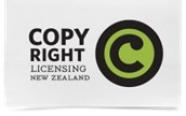Intellectual property key terms: Copyright
Copyright
Copyright protects original written works, computer programs, music, art and designs, photographs videos, movies, broadcasts, tape recordings, and CDs – in whatever format they are available, including online.
Copyright owners can legally prevent others copying their work, issuing copies to the public (such as by selling), making an adaptation of the work (such as writing a film script from a book), performing, playing, showing, or broadcasting the work in public.
Copyright comes into effect immediately – you do not first need registration.
Protection lasts for a certain term of years, depending on the kind of work and the country.
For example, in New Zealand, a written work is copyright for the lifetime of the author plus an additional 50 years. Once the term of copyright has expired, the work falls into the public domain for anyone to use.
Printed works beyond that limit, such as the works of William Shakespeare, are no longer copyright. Anyone can publish them or adapt them for other media, such as the cinema.
However, a recently published edition of a work or body of work has its own copyright, usually for 25 years. Thus, a recently published volume of Shakespeare's plays cannot be photocopied without permission from the publisher
Copyright in industrial designs
Designs that are industrially applied are protected in New Zealand by copyright for a term of 16 years.
"Industrially applied" means when more than 50 copies of the article are made or when the article is produced in lengths such as sheets or piping.
The copyright in industrial designs actually protects the 2-D drawings or plans (as artistic works) from which the 3-D products are then manufactured.
Most overseas copyright laws do not protect industrial designs. Overseas manufacturers need to apply for a patent or a registered design.
Copyright and fair dealing
Copyright is not a monopoly like a patent or registered design – the defence of fair dealing applies to some uses of copyright works that are permitted by law for the public benefit.
The reason for the defence is partly because the copyright term is much longer than other Intellectual Property (IP) rights. The problem is that only the courts can decide what is fair – so it can be risky to rely upon fair dealing.
Examples where the defence is likely to apply include copying small excepts of a copyright work for a person's own private study or research provided it is "fair" to do so (in rare circumstance this could be a full copy), and quoting extensively from a copyright work for criticism or review.
Moral rights
Moral rights are a way of acknowledging the reputation of an author of certain copyright works. They are particularly important when the copyright in the work does not belong to the author – for instance because the copyright belongs to their employer or their publisher. The term of moral rights is the same as the term of copyright.
Authors retain the right to be acknowledged as the authors of the work, and they must assert that right.
Authors also have the moral right not to have their work subjected to derogatory treatment which might damage their reputations – for instance reproducing someone's artistic work as a cartoon or republishing work commercially when it is out of date and incorrect.
A third moral right is that of wrongful attribution. This means wrongfully stating that a certain person created a copyright work when in fact they did not.
Moral rights do not apply to all copyright works – one important exception is computer programs.
Copyright licences for schools
The Copyright Act permits some uses of copyright works for educational and library purposes. However, the permitted uses are limited and inadequate for much teaching.
One example is where multiple copies of copyright literary works are needed for students. As a result, New Zealand schools and universities pay for a copyright licence from a collecting society representing authors and publishers.
Primary and Secondary Schools Licence – a simple, affordable copyright compliance solution provided by Copyright Lecensing New Zealand.
This licence allows teachers to make multiple copies of parts of copyright literary works for teaching purposes. In return the organisation pays royalties to authors and publishers whose works are copied for educational purposes.
A similar collecting society is APRA AMCOS – Australasian Performing Right Association Limited (APRA) and Australasian Mechanical Copyright Owners Society (AMCOS). These grant permissions for the performance and use of recordings of copyright music both in schools and commercially.
Copyright organisations
Copyright Licensing New Zealand (CLNZ) – provides licences to help make copying, scanning, and sharing printed works easy and helps everyone who copies and shares anything from books and journals do so legally.
Creative Commons – an international nonprofit organization that helps overcome legal obstacles to the sharing of knowledge and creativity.
One of organisation's service is providing a selection of free downloadable licences for copyright authors to attach to their digital works.
Creative Commons License Options – choose from six basic licences. The least restrictive licence permits others to add to or amend a work, even for commercial reasons, provided they acknowledge the original author. The most restrictive licence allows others to download and share works with others so long as they mention the authors and link back to them, and they cannot change the work in any way or use it commercially.
The original Creative Commons licences were based on United States' copyright law. They have been used internationally for some time.
New Zealand has recently developed its own versions based upon our own copyright law. These are more appropriate for New Zealand copyright owners.
Public domain tools – enables authors and copyright owners who want to dedicate their works to the worldwide public domain to do so
IP Case study
Nancy's Stitch Studio – page on this site that is a case study of how an online store in Wellington incorporated intellectual property in its business products.


